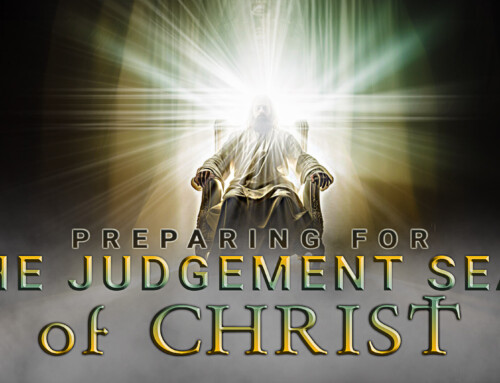AN INTRODUCTION TO THE UPCOMING BOOK “ INCENTIVIZED TO OVERCOME – A SYLLABUS TO AWAKEN FROM SPIRITUAL APATHY”
*Note: The goal is to complete the book within a year’s time, God willing.
This work is intended as an outline for Bible teachers to restore the Foundational Truths of the Scriptures lost to Christians. We say lost because many of these truths were understood in the 1st century and known and accepted by our early Church Leaders, as revealed in their writings. The truths contained in this book can also be used to exhort all Christians to dig deeper in the Word and to learn to apply the wisdom gleaned herein in their daily lives. Refer to the Table of Contents of this book to see the variety of topics we will examine. Amongst many subjects, we will discover the beauty of the types and shadows intricately woven throughout the Old Covenant, and we will also realize how it gives us a clearer understanding of Bible prophecy. We will study how man is a 3-part being, investigate where the soul goes upon death, and learn why Christendom needs to awaken from spiritual apathy and grasp the importance of living holy, sanctified lives through the infilling power of the Holy Spirit.
FUNDAMENTALS
The entire Bible MUST harmonize. Whatever our understanding is of what is written in the New Testament, it must completely harmonize with Genesis, Exodus, Leviticus, Numbers, Deuteronomy, the Psalms and the Prophets.
The foundation for our understanding requires we look back in a straight line to the Garden of Eden and straight forward through the End Times in the Book of Revelation. All “dots” must connect. If in our study of theology, the line or the dots do not connect, then there is need for more understanding with revelation. [See Acts 8:31] We can only have as much understanding of the Books of Matthew through Revelation as we have of the Books from Genesis to Malachi.
Several things are foundational in our knowledge of God, and are key to understanding Scripture. A couple being the truth that God often does not get His Will, and knowing why that is so. The difference between the desired will of God being done (His Thelema) and His Sovereign will being done (His Boulema) can be seen in the following example. If the Captain of a ship sets sail from London to New York, he has a set, determined will (Boulema) and will arrive there. He has 500 passengers and his desired will (Thelema) is for all of them to follow the laws of the ship while they’re onboard. However, this probably won’t happen. The Captain knows that he will get to his destination but he doesn’t know what each passenger will do while on the ship. Correspondingly, God’s sovereign will (Boulema) surely comes to pass and yet He has a desired will (Thelema) for each person. However, His desired will may not take place for man has free will and consistently resists God’s desired will. (Though in this case God has foreknowledge of what men will do, and had a future and hope for them.) So while the fulfillment of His Thelema desired will is dependent on our actions, His Boulema sovereign will is set in stone and cannot be resisted. It will assuredly come to pass, such as God’s irrevocable promises to fulfill His covenant with Israel.
- W. E. Vine – “Man is able to resist the will, the thelema, of God, but whatever takes place God’s determinate counsel, boulema, is never prevented from fulfillment. Thelema, when used of God, signifies a gracious design (cp. Ro 2:18; 12:2; 15:32); the similar word boulema denotes a determined resolve (see Ro 9:19). To do the will of God, then, is to yield ourselves to the accomplishment of His designs for us by obeying Him in all that He has revealed to faith, cp. Ro 1:17; He 11:3. But since neither the desire, nor the power, to do the will of God, dwells naturally in the believer, God works in Him “both to will and to work of His good pleasure,” Php 2:13, cp. He 13:21 and 1Co 12:6. This, however, does not relieve the believer of his responsibility, for he is to “understand what the will of the Lord is,” Ep 5:17, and understanding it, he is to do it from the heart, Ep 6:6. (Vine, W. Collected writings of W. E. Vine. Nashville: Thomas Nelson)
According to the yieldedness of our “will”, God is able to work in us through our conscience. The spiritual dynamic of this and man’s “will” is made clear in the chapter dealing with man’s having been created as a triad being; spirit, soul and body.
Modern day Christian leaders, in general, have wrongly overemphasized God’s attribute of Love and Goodness in the Gospel, at the expense of His Holiness and Just Severity. Through those glasses, all things Scriptural will be out of focus. This one-sided or narrow perspective limits knowledge of God, and blinds us to truth as it eliminates clear understanding of Scripture. Scripture reveals GOD IS LOVE. But reverently speaking as a man, that is not all He is. God has revealed His Majestic Character in Scripture….
Moses wrote: “And the Lord passed by before him, and proclaimed, The Lord, The Lord God, merciful and gracious, longsuffering, and abundant in goodness and truth, Keeping mercy for thousands, forgiving iniquity and transgression and sin, and that will by no means clear the guilty; visiting the iniquity of the fathers upon the children, and upon the children’s children unto the third and to the fourth generation. And Moses made haste, and bowed his head toward the earth, and worshipped.” [Exodus 34:6,7,8]
Hosea writes of these righteous attributes in the Almighty, and how they will work together in His Salvation Plan for the Jews. “And I will betroth thee unto me for ever; yea, I will betroth thee unto me in righteousness, and in judgment, and in lovingkindness, and in mercies.” [Hosea 2:19]
A further example of this revealed harmonious multiplicity in God’s Character is found in Romans 11:22 which is along the same lines as in Hosea. The context is again relating to His Salvation/Restoration Plan of the Jews, but here it also covers His present dealings with the Gentiles.“For if God spared not the natural branches, take heed lest he also spare not thee. Behold therefore the goodness and severity of God: on them (the Jews) which fell, severity; but toward thee, goodness, if thou continue in his goodness: otherwise thou also shalt be cut off. And they also, if they abide not still in unbelief, shall be grafted in: for God is able to graft them in again.” [Romans 11:21-23]
To rightly discern truth from Scripture (Old and New Covenant writings) one must comprehend God from His revealed attributes working in harmony in Scripture’s truth. The truth is that He has both attributes of Love and Mercy and also of Holiness and Justice. Love and Mercy being that desire or will which more aligns with His emotions; that is to say the thelema of God. (We again speak here as mere man.) And Holiness and Justice being that which aligns with His Holy reasoning. God, after deliberation, chooses a plan based on the wisest just course of action to accomplish His boulema/sovereign will. This Scriptural understanding helps define the reality of God’s conditional and unconditional promises, on which this book is written. All of God’s promises are not unconditional. Some are dependent on our actions. For example, the promise of imputed righteousness came as a result of a one-time event when we chose to have our sins atoned for by the Blood that Christ shed on His cross. It was an unconditional free gift not based on any works. Then there is an earned or merited righteousness which is the result of carrying our own crosses. This is a lifelong process. Not all Christians choose to resist the flesh and be conformed into the image of Christ. Many fail to fulfill God’s desired will for their lives, and thus fail to receive the conditional promises of reward which are held out to all justified believers. While all Christians have the potential to receive these rewards, way too many see no reason to mature and become complacent in their state of lethargy. They’ve fallen prey to the gospel of presumptuousness, thinking they’ve already attained, believing that Christ did it all for them. After all, God is Love. But they forget that because of His Justice, He also requires a standard of Holiness.
As a result of this modern–day, one-sided view of God’s attributes being only Love and Mercy, (to the skewing of His other attributes of Holiness and Justice) the New Testament word “grace” is generally portrayed by modern–day Christendom to mean primarily, or solely, “God’s undeserved, unmerited favor.” This term is rightly used when ministered to the unregenerate as the “Gospel” of Jesus Christ of eternal life in lieu of eternal death. But then this term is later wrongly used as an all-inclusive means to pronounce to Christians the impossibility of losing God’s promises. This is a deceiving doctrine greatly detrimental to unwitting and merely born-again Christians. They are taught to misappropriate unto themselves those Scriptures which define the promises that are meant for the sanctified (the faithful, fruit-bearing believer) only.
The all–inclusive interpretation is fully warranted when “Grace” is contrasted with debt (Romans 4:4,16) or works (Romans 11:6 & Ephesians 2:8,9) and/or with the law of Moses. (John 1:17) Clearly, the meaning of the word in these instances reveals that God’s Divine influence or power to rebirth/reanimate man’s spirit and grant the gift of eternal life came unconditionally. And therefore, it was undeserved and unmerited to repentant men solely based upon the merit of Jesus Christ’s personal sacrificial offering to God as the Son of Man.
But additionally and vitally important to understanding the fullness of God’s salvation plan is the fuller or more complete definition of that word interpreted from the Greek as “grace’. This fuller definition of the word grace, as opposed to just being a merely born again receiver of the gift of eternal life (that which shall be more defined later) goes far beyond just being born-again. Rather than being defined solely as undeserved and unmerited, grace is also defined as God’s favor and Divine influence or power. This is conditional, that is to say, deserved and merited, and brought to forebear only when there is a “will and action of living faith” to yield to God’s revealed will/desire.
The Character of God in His attributes has allowed for the Righteousness of Jesus Christ alone to stand as the propitiation for man to receive eternal life. (This is typed in Adam’s being forgiven and clothed by God in animal skins.) But man must have a certain righteousness worked out in him that he might enter again back into the presence of God. (This is typed by the sweat of Adam’s brow for his sustenance, in that he must now hoe and work the soil. And it is typed in that Adam was not granted access back into the Garden based upon forgiveness of sin and regeneration alone.) The fact that work that was necessary for Adam to do is seen in the 2nd Adam, in the Son of Man’s victory over the flesh, the World and satan. He set the example that we must now will to walk and mind the indwelling Power of the Holy Spirit.
So while the free gift of eternal life is found solely in the righteous act of Jesus Christ and is imputed to any repentant man, (that which we ascribe to God’s Love and Gracious Mercy) it yet cannot be so that man may enter back into His Holy presence based solely on imputation of Christ’s Blood. The propitiation to attain unto His Holiness, and the return of suitable clothing in glory worthy of His presence, man must have the element of a righteousness of his own. A righteousness which is worked out in him by yielding his will in living faith to a growing influence of the Word and Holy Spirit on his nature unto wholeness/holiness. This is done with fear and trembling, with suffering, and discipline, that which without no man will enter into His presence. [Hebrews 12; Philippians 2]
- E. Vine’s Expository Dictionary of New Testament Words explains:
“In James 4:6, “But He giveth more grace” (Greek, “a greater grace,” RV, marg.), the statement is to be taken in connection with the preceding verse, (5) which contains two remonstrating (forceful), rhetorical questions, “Think ye that the Scripture speaketh in vain?” and “Doth the Spirit (the Holy Spirit) which He made to dwell in us long unto envying?” (See RV). The implied answer to each is “it cannot be so.” Accordingly, if those who are acting so flagrantly, as if it were so, will listen to the Scripture instead of letting it speak in vain, and will act so that the Holy Spirit may have His way within, God will give even“a greater grace,” namely, all that follows from humbleness and from turning away from the world.”
Therefore, the further greater grace/divine influence on the heart, which is the fuller intent of the New Covenant, is for a greater work within us. It is a work that goes beyond that grace (of undeserved unmerited favor) of the regeneration gift of eternal life. It is a work of the Holy Spirit, and it is based upon the merit of humbly yielding our will in loving obedience to the Word. Wherein is found the cleansing/purging greater work of the Holy Spirit upon our carnal soul, resulting in growing Christlikeness in sonship reflected in faithful works of worthiness. The issue after regeneration is no longer eternal life, but the quality of eternal life. That is, whether we are to be found worthy or not to share in His Glory. Eternal life being an unconditional gift, whereas the state of eternal glory is conditional. “And if children, then heirs; heirs of God, and joint-heirs with Christ; if so be that we suffer with him, that we may be also glorified together.” [Romans 8:17] This is the fullness of “Salvation”; that intent of God’s Heart.
These things ought to be the central principles of one’s whole understanding about God, a key for the interpretation of anything. The student of God’s Word is encouraged to study the Word to see if these things be so. [Acts 17:11]




Leave A Comment